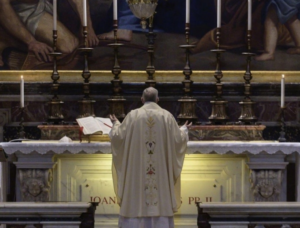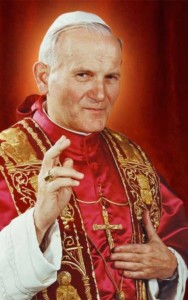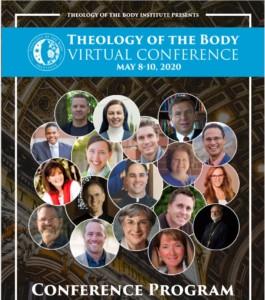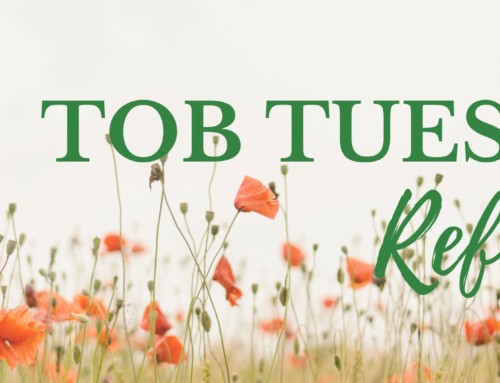This week’s TOB Tuesdays is a special edition, “Be Not Afraid” by Jack Henz.*
 On May 18, 2020, we celebrated the 100th anniversary of St. John Paul II’s birth. Pope Francis, while celebrating a commemorative Mass at St. John Paul II’s tomb in St. Peter’s Basilica, quoted from the day’s responsorial psalm, which declared, “The Lord loves his people” (Psalm 149:4).
On May 18, 2020, we celebrated the 100th anniversary of St. John Paul II’s birth. Pope Francis, while celebrating a commemorative Mass at St. John Paul II’s tomb in St. Peter’s Basilica, quoted from the day’s responsorial psalm, which declared, “The Lord loves his people” (Psalm 149:4).
In his homily he stated: “And today we can say here 100 years ago the Lord visited his people, sent a man, prepared him to be a bishop and lead the Church. In memory of St. John Paul II, we take this up again: ‘The Lord loves his people,’ the Lord visited his people, he sent a pastor” (National Catholic Register). Pope Francis implied that St. John Paul ll was a shepherd who not only went to his flock, but knew them and their needs.
The “Theology of the Body” is St. John Paul II’s
integrated vision of the human person.
Perhaps this saintly shepherd’s lasting gift to humanity and the Church will be his rich, dense, and insightful “Theology of the Body.” The “Theology of the Body” is St. John Paul II’s integrated vision of the human person. The human body, he said, has a specific spousal and sacramental meaning, “making visible the invisible.” Additionally, it is capable of revealing answers regarding fundamental questions about us, our needs, and our lives – questions such as:
- Is there a real purpose to life and if so, what is it?
- What does it mean that we are created in the image of God?
- Why are we created male or female?
- Does it really matter if we are one sex or another?
- What does the marital union of a husband and wife say to us about God and His plan for our lives?
- What is the purpose of the married and celibate vocations?
- What exactly is “love”?
TOB provided solid answers to me that satisfied my intellectual and emotional needs.
 Questions like these were always on my mind before I received instruction and formation in the “Theology of the Body.” TOB provided solid answers to me that satisfied my intellectual and emotional needs. I have to agree with Christopher West’s quote about the human impact of St. John Paul ll’s TOB:
Questions like these were always on my mind before I received instruction and formation in the “Theology of the Body.” TOB provided solid answers to me that satisfied my intellectual and emotional needs. I have to agree with Christopher West’s quote about the human impact of St. John Paul ll’s TOB:
“Brace yourself! If we take in what the Holy Father is saying in his Theology of the Body, we will never view ourselves, view others, view the Church, the Sacraments, grace, God, heaven, marriage, the celibate vocation…we will never view the world the same way again.”
This quote also sets the stage to describe the intersection of the current coronavirus pandemic and TOB. Given the intensity of the Covid-19 crisis of the past three months, I doubt any of us will be able to view the world the same way again. Significant numbers of people have lost their incomes and jobs, needed supplies for living have become scarce, and long lines have formed at food banks. Tens of thousands of have died in the US alone and more than 350,000 worldwide. Schools, businesses, and churches have been closed to spare life. Whole cities have been under quarantine for weeks.
It feels like we are going through a physical and spiritual reset of the entire world. The world needs God more than ever and St. John Paul ll’s 100th birthday anniversary provided a focal point for a world-wide virtual conference on the “Theology or the Body” just when we needed it most.
The world needs God more than ever and St. John Paul ll’s 100th birthday anniversary provided a focal point for a world-wide virtual conference on the “Theology or the Body” just when we needed it most.
During the weekend of May 8-10, 2020, over 77,000 people, including me, “binge-watched” by virtually attending the Theology of the Body Virtual Conference. Talks by over 70 of the best TOB speakers on the planet were accessible throughout the weekend. This conference not only boosted my spirits but provided for me a rare opportunity to “mix and mingle” with fellow “attendees” in a very engaging manner in the comments section of each talk.
 Everyone had something to say about how St. John Paul ll or his TOB had profoundly influenced their lives. Many shared deeply moving testimonials as to how their brokenness was repaired and of the inspiration they received from this great saint in the midst of suffering.
Everyone had something to say about how St. John Paul ll or his TOB had profoundly influenced their lives. Many shared deeply moving testimonials as to how their brokenness was repaired and of the inspiration they received from this great saint in the midst of suffering.
As I reveled in this TOB feast, a pattern began emerging in my mind as to four primary types of TOB speakers/presenters. Below is my attempt to organize this massive amount of TOB information into categories I found helpful. These observations are based on their presentations and biographies. Of course, I apologize to all the speakers I couldn’t include as I could only listen to a couple dozen of the many wonderful presentations.
Most of the speakers I listened to fell into one of four loosely defined categories:
- Evangelists: The Evangelists were interested in sharing God’s Great Love Story with all the attendees and, in particular, the great love message of the “Theology of the Body” and St. John Paul II. These “TOB evangelists” included: Christopher West’s passionate reaching into our hearts with the seeds of TOB and God’s love for us; Chris Stefanick’s call to get back to the basics of sharing the kerygma with intimate details of TOB and God’s love story for humanity; and Fr. Patrick Schultz’s heartwarming and tear-inducing insights into a priest longing to serve his Church and feed his parishioners the Eucharist. All the evangelists speaking at the conference gifted our hearts with God’s loving message and moving us closer to Him.
- Theologians: The theologians are “the deep divers” of the dense TOB text. They unfold a deeper understanding of John Paul II’s language, philosophy, and novel insights. They have the unenviable task of reading, re-reading, and re-reading again the ever-circling thoughts of St. John Paul II and bringing them to us in tiny bits and morsels that we can grasp with our intellect and absorb into our souls: Dr. Bob Schuchts tracing the weakening of masculinity and femininity by cultural conspiracies through the ages – from Adam’s failure to act on Eve’s behalf to sitcoms like Will and Grace to the desperate impact on today’s children and their families; Katrina Zeno’s linking of the Four Holy Communions designed by God with the degrees of happiness we can experience depending on the depth of our commitment to union and communion with each other, the Eucharist, and the Trinity; and Fr. Don Calloway’s original unpacking of the Divine romance of Mary and Joseph who sacrificed their bodies to attain a chaste, virginal marriage of love. The theologians add substance to our understanding of TOB within the broader framework of faith, Scripture, and trust in God.
- Catechists: The catechists arm us with the courage to confront daily challenges to our faith and to commit ourselves to implementing the inspiration and knowledge we receive from the evangelists and the theologians: Christian and Christine Meert cited concrete do’s and don’ts from their TOB-based marriage-preparation program, which is achieving success with the upcoming generations; Mary Beth Bonnaci provided insightful ways to introduce TOB practices into the workplace by reminding us work is created for man’s fulfillment through the gifting of self to others while also bringing Christ into our careers; and Heather Kym provided a deeply personal example of how her husband’s addiction to pornography almost destroyed their marriage until they both learned together about TOB and brought its essence into their marriage. The spiritual guidance and insights they drew from their personal experience and TOB provided a solid, practical foundation for living our faith in the family, workplace, and a non-Christian culture.
- Clergy and Religious Orders: Members of the clergy and religious orders help us find our home with God in many sacramental and prayerful ways. Their spiritual fatherhood and motherhood provided welcoming arms extended to us by Christ: Fr. Jacques Phillippe’s soft yet well-seasoned words on the importance of prayer and longing for God where he recommended we face God in solitude and silence in order to enter into intimate, loving communion with Him; Sister Helena Burns offered poignant insights into the resurrection of the body and the importance of maintaining a healthy spiritual appreciation of the body/soul connection; and Rebeca Barba of Regnum Christi offered intimate insights into living a single, chaste life dedicated to union and communion with our Trinitarian God in a very hostile secular culture. The words of our clergy and religious resonate with our human longing for and participation in union and communion with God so as to feel “at home.”
After allowing my thoughts to marinate for a week, I made a list of general “take-aways” and new insights I received during the conference:
- The TOB teachings of St. John Paul ll have amazing, far-reaching impacts from the finite scale of individuals to the global scale of nations. TOB penetrates to the depths of individual’s hearts all the way to international leaders of our Church.
- The word “zakar” means “the remembering one.” It reminds men that they are called to pass on the living memory of God and His covenants in their families and the world, and to be openly receptive and loving to their wives.
- Multiple speakers and laity mentioned, “Why didn’t I hear about TOB earlier in my life? TOB is life changing, and everyone needs to learn about it.”
- Many speakers also mentioned they were taught to hide sex or that it was just a human appetite. However, once they encountered TOB’s insights into the conjugal embrace and our union and communion with the Trinity, their understanding of marriage (and their own experience of it) was lifted to another level.
- TOB transforms marriages. Many participants commented: “TOB saved my marriage from my spouse’s addiction to pornography and re-directed our recovery together.” I eventually gave up counting how many times I read this comment.
- The man/woman relationship is clearly defined by TOB (and Scripture) compared to the current sexual and gender morass fostered by our secular culture.
- The desperate needs of our priests for communion with their parishioners – to interact with them, to feed them (Eucharist), and to comfort them (Reconciliation).
- The potential doctoral thesis awaiting someone who will unpack the Divine marriage and love story of Joseph and Mary. Joseph is often depicted in paintings and essays as old and worn out. However, he was a carpenter and builder, which were both trades requiring a strong, virile younger man. Mary and Joseph had a chaste and loving marriage by design and acceptance.
- “I made you for more.” TOB has inspired so many original “made-for-more” lives than I ever imagined. I am convinced it will be a primary force in the re-emergence of our Church in the centuries ahead.
- TOB is a “theological time bomb” that is going off now and will drive the Catholic Church for the next millennium (or two or three!).
“Have no fear of moving into the unknown. Simply step out fearlessly knowing that I am with you, therefore no harm can befall you; all is very, very well. Do this in complete faith and confidence.” –JPII
 Later in the week, I heard Pope Francis cite a 2014 quote from St. John Paul ll in a homily on fear: “Have no fear of moving into the unknown. Simply step out fearlessly knowing that I am with you, therefore no harm can befall you; all is very, very well. Do this in complete faith and confidence.” St John Paul ll was speaking on the necessity of trusting in God whenever we face fear. I think this quote summarizes well the mission of St. John Paul II’s life and the TOB Virtual Conference – to instill in every person complete faith and confidence in a loving, faithful God so as to go forth and “Be not afraid!”
Later in the week, I heard Pope Francis cite a 2014 quote from St. John Paul ll in a homily on fear: “Have no fear of moving into the unknown. Simply step out fearlessly knowing that I am with you, therefore no harm can befall you; all is very, very well. Do this in complete faith and confidence.” St John Paul ll was speaking on the necessity of trusting in God whenever we face fear. I think this quote summarizes well the mission of St. John Paul II’s life and the TOB Virtual Conference – to instill in every person complete faith and confidence in a loving, faithful God so as to go forth and “Be not afraid!”
©by Jack Henz
 *Jack Henz is a retired meteorologist and a graduate of the Diocese of Phoenix ‘s Kino Catechetical Institute. Together with his wife Karen, he is a passionate catechist concerning all things Catholic, especially the Theology of the Body.
*Jack Henz is a retired meteorologist and a graduate of the Diocese of Phoenix ‘s Kino Catechetical Institute. Together with his wife Karen, he is a passionate catechist concerning all things Catholic, especially the Theology of the Body.
We invite you to share your own 2-3 line reflection on our JPII Resource Center Facebook page by clicking here.



